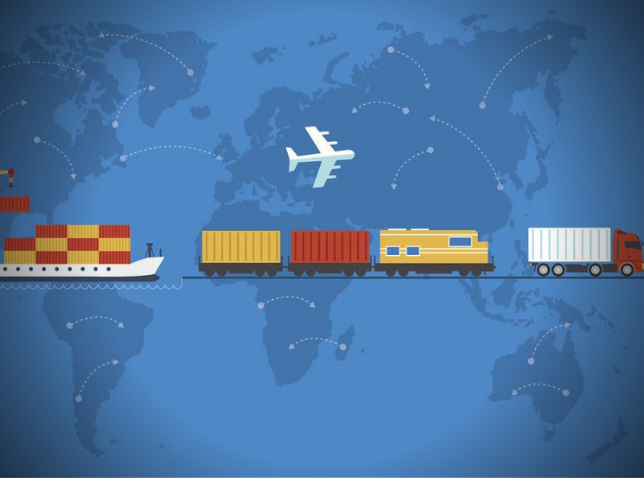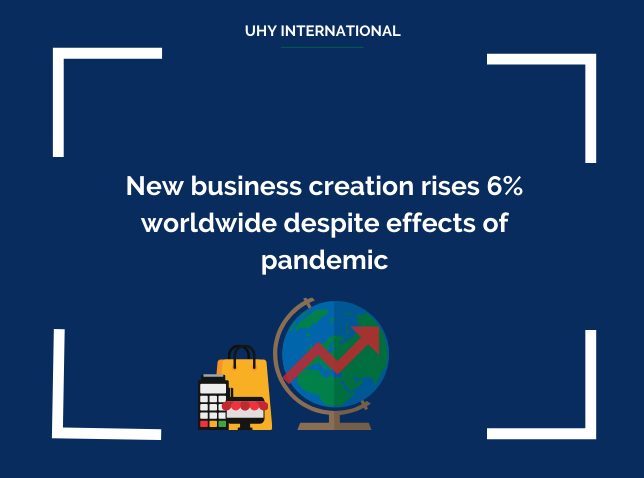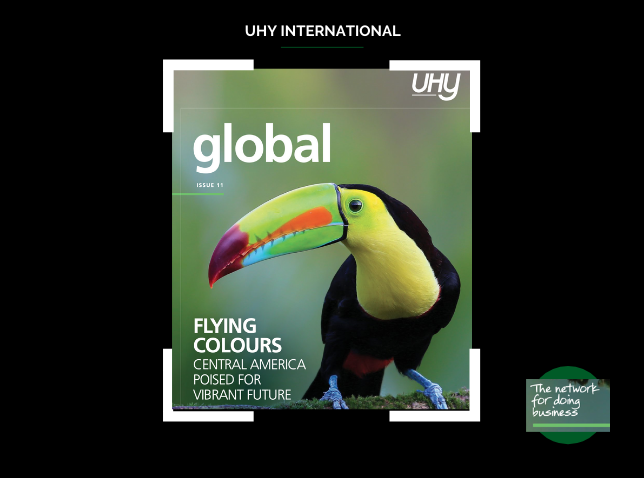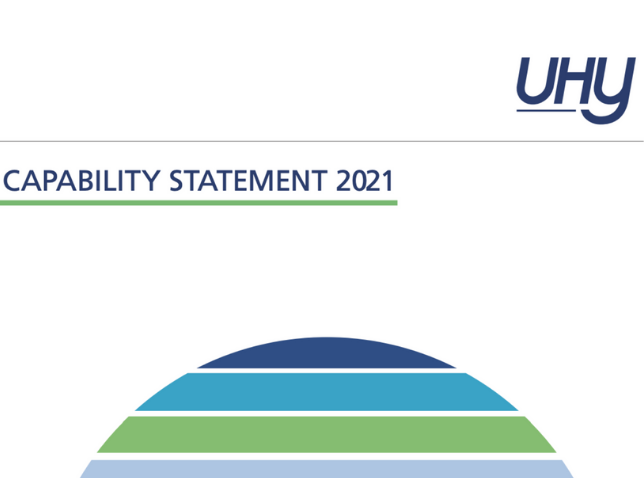UHY International: New world Order?

This post is also available in: Français (French)
As populism and nationalism threaten to destabilise traditional trading relationships, UHY member firms can help business navigate the choppy waters of cross-border commerce
In February 2019, Bank of England governor Mark Carney told an audience of senior City of London figures that new global order was threatening international trade.
Carney, head of the UK’s National bank, talked first about the implications of Brexit, but his message was targeted more widely than the UK’s exit from the European Union (EU). In fact, he suggested Brexit might be a canary in the coal mine’ for a new era of global economic retrenchment.
“It is possible that new rules of the road will be developed for a more inclusive and resilient global economy,” Carney said, before delivering a warning. “At the same time, there is a risk that countries turn inwards, undercutting growth and prosperity for all. Concerns over this possibility are already impairing investment, jobs and growth, creating a dynamic that could become self-fulfilling.”
His concerns appear well-founded. In January, the International Monetary Fund (IMF) warned that the global economy was weakening faster than expected, thanks to trade wars and populist governments wedded to policies of protectionism. At the same time, the United Nations’ (UN) trade and development body, UNCTAD, published figures showing a 19% fall in global foreign direct investment in 2018.
Have we entered a new era of nationalism and protectionism?
Restrictive Measures
World Trade Organisation (WTO) members added an average of 11 trade-restrictive measures every month between October 2017 and May 2018, including tariff increases, import tax increases and stricter customs regulations.
National leaders are driving these measures. Most famously, Donald Trump’s America First’ agenda has seen US withdrawal from the Trans-Pacific Partnership 9 a trade agreement between 11 countries bordering the Pacific Ocean), and a trade war with China involving the tit-for-tat imposition of trade tariffs worth billions of dollars. The US has also threatened tariffs on a range of goods from the European Union (EU).
A wave of global populism followed in the wake of Trump’s election to the US presidency at the end of 2016. In May last year, Italian voters placed power in the hands of two populist parties, the Five Star Movement and the league. Relations between the EU and Rome have been strained by the new government’s spending plans, which may breach EU rules.
Is Italy becoming anti-European? Cristiano Fasanari, a partner at FiderConsult Srl, a UHY member firm in Italy, says the Italian government is pushing back against some policies but remains a committed member of the EU. “There is no declared scepticism over the EU,” he says. “I would say that there is disagreement with some EU policies and with the strict application – almost an imposition – of restrictive budget policy and financial ratios.”
Italy is far from alone in electing a populist government with a more nationalist and inward-looking agenda and, often, a corresponding suspicion of the traditional trading relationship. In fact, the four most populous democracies in the world are currently governed by populist leaders: Narendra Modi in India, Donald Trump in the US, Joko Widodo in Brazil. Populist ideas have swept through Europe, resulting in both far-right nationalist governments like that of Viktor Orbán in Hungary, and anti-establishment sentiment of the kind expressed in the UK’s Brexit referendum vote.
Global Trade Too Important
More economic protectionism sometimes seems inevitable in populist times. But in Brazil, José Bendoraytes Filho, advisory partner at UHY Bendoraytes & Cia, does not believe that the Bolsonaro government will follow President Trump down a road of hard protectionism, despite mutual admiration between the two leaders.
“The current Brazilian government does not have as much of a protectionist character as many people think,” he says. “Although Brazil is in line with US immigration and trade policies, it does not have the motto ‘Brazil First’. We are a country open to other markets and have balanced trade with a high level of imports.”
José says that, with taxes and unemployment high, Brazil’s global trade is too important to the economy to risk. He adds: “There is a constant search for the conquest and maintenance of foreign markets through development and export agencies, as well as the Brazilian embassies abroad that today function as true promoters of Brazilian products.”
But while a generally positive sentiment towards global trade persists, the Brazilian government has expressed frustration with Mercosur, a trading bloc comprising Argentina, Brazil, Paraguay, Uruguay and Venezuela. German chancellor Angela Merkel recently warned that the Bolsonaro government’s attitude was making a trade deal between Mercosur and the European Union more difficult to reach.
José says that Mercosur imposes limitations on the bilateral agreements member countries can make outside the bloc, and many Brazilians agree with the government’s intention to reduce Brazil’s engagement with an economic and political union they consider restrictive.
Populism And Uncertainty
President Bolsonaro has vowed to modernise Mercosur rather than leave it altogether. But the desire to strike bilateral trade deals as a more independent nation-state finds an echo in the UK’s vote to leave the European Union (EU).
Brexit was an unashamedly populist movement, driven by anti-establishment and anti-elite rhetoric. Nigel Farage, the movement’s self-styled ‘man of the people’, has said that European integration showed “a complete lack of understanding of how human beings operate,” and that ” globally, the world is breaking down into smaller units.”
Business Suffering From Uncertainty
The anti-EU movement in the UK was a blow against open borders and what Farge characterised as an out-of-touch political elite as much has trading bloc. But ‘leavers’ believed that in economics too, the world was “breaking down into smaller units”. They insisted, and continue to insist, that a country with a proud trading history would be more than capable of holding its own outside what they view as the EU’s stifling embrace.
The theory has yet to be properly tested. What we are seeing now from business, says Martin Jones, partner at UHY Hacker Young in London, UK, is a period of retrenchment, in response to both Brexit and wider global trends.
“Inevitably the uncertainty is affecting investment levels and new cross-border activities, and also causing businesses to delay hiring staff due to concerns over the economic outlook,” he adds.
Alan Farrelly, managing director of Irish member firm UHY Farrelly Dawe White Limited, agrees that business decisions have been delayed or postponed because of the fog around Brexit – a fog that is unlikely to lift any time soon, regardless of the precise moment of separation. Ireland is the state in the EU economy most dependent on trade with the UK, and considerable resources are being expended on preparing for whatever Brexit might bring.
“In terms of advice on Brexit, we work with InterTrade Ireland who provide a grant of EUR 2,500 (around USD 2,825) to assess a company and their exposure to the threat of Brexit,” says Alan. “This allows us to consider a company’s import and export flows to assess its overall business disruption exposure. Outputs include our clients seeking alternative suppliers and customers in new locations, most often inside the EU. This has represented real challenges in terms of pricing, testing and logistics.”
More widely, Alan believes President Trump’s policies and Brexit are symptoms of a new trading reality that will have a significant impact for years to come.
“As we all know, trade deals are not negotiated in real-time ‒ there are considerable time and resources required to find agreement,” he says. “With Brexit, the road ahead for both Ireland and the UK may be challenging, with jobs losses, loss of business confidence, stressed decision-making and prolonged intergovernmental tensions. None of these is conducive to good trading conditions.”
Anti-Elite, Anti-Establishment:
President Bolsonaro has vowed to modernise Mercosur rather than leave it altogether. But the desire to strike bilateral trade deals as a more independent nation-state finds an echo in the UK’s vote to leave the European Union (EU).
Brexit was an unashamedly populist movement, driven by anti-establishment and anti-elite rhetoric. Nigel Farage, the movement’s self-styled ‘man of the people’, has said that European integration showed “a complete lack of understanding of how human beings operate,” and that “globally, the world is breaking down into smaller units.”
An Opportunity To Shine?
In these circumstances, what advice can professional service providers give? Martin Jones at UHY Hacker Young in London believes global uncertainty makes life tricky, but also gives UHY firms an opportunity to shine, establishing themselves as trusted business advisors in difficult times.
“Despite the uncertainties, all businesses still need to plan for the future, and hence it is important to understand the risks and opportunities that could emerge,” he says. “It is important to remain positive as a business advisor in this situation and seek to establish a competitive advantage for the business amid all the change, based on an assessment of the opportunities and risks. It does make the role harder, but potentially more enjoyable and rewarding.”
Perhaps counter-intuitively, the consensus is that in an era marked by isolationism, UHY member firms should be readier than ever to give expert advice to clients looking to expand operations beyond home markets. In the UK, that might mean helping clients reduce their exposure to the EU. In Brazil, it could mean manoeuvring businesses around any obstacles imposed by the redrafting of the rules of Mercosur.
Ultimately, some trading arrangements may change, and others may emerge. Populism will eventually subside and protectionism ease. And when the shouting stops, Cristiano Fasanari at UHY FiderConsult Srl in Italy says that successful businesses will still look to expand. They just need the best advice to help them do so.
“In my opinion, this situation is not permanent and will end. So I would not discourage customers who intend to invest internationally. I would rather explain that, even in this period, maintaining a position that is limited to a local market is a disadvantage compared to global competitors.
“With the right attention, investing internationally is still necessary for future success.”
Fair Exchange
Whether bilateral, multilateral or regional, free trade agreements bear witness to a desire for economic cooperation. They may be ‘shallow’ agreements, covering policy around tariffs and borders; or they may be ‘deep’ agreements, covering multiple policy areas that affect trade and investment in goods and services, including competition policy, government procurement rules and intellectual property rights.
Regional trade agreements cover more than half of global trade and operate alongside global multilateral trade agreements such as the North American Free Trade Agreement (NAFTA) under the auspices of the World Trade Organization(WTO). The number of regional trade agreements in operation has increased considerably over the past three decades: the World Bank records 50 agreements in force in 1990, compared with over 290 as of January 2019.
Our infographic, Fair Exchange, looks at some of the big players in global trade.
Notes for Editors
José Bendoraytes Filho, Advisory partner, UHY Bendoraytes & Cia, Rio de Janeiro, Brazil
Email: jose.bendoraytes@uhy-br.com– +55 21 98111 3999 www.bendoraytes.com
Alan Farrelly, Managing director, UHY Farrelly Dawe White, Dublin, Ireland
Email: alanfarrelly@fdw.ie – +35 342 933 9955 – www.fdw.ie
Cristiano Fasanari, Partner, FiderConsult Srl, Rome, Italy
Email: c.fasanari@uhyitaly.com– +39 06 591 7469 – www.uhyitaly.com
Martin Jones, Partner, UHY Hacker Young, London, UK
Email: martin.jones@uhy-uk.com – +44 20 7216 4694 – www.uhy-uk.com
Established in 1986 and based in London, UK, UHY is a leading network of independent audit, accounting, tax and consulting firms with offices in over 320 major business centres across more than 95 countries.
Our staff members, over 8,100 strong, are proud to be part of the 16th largest international accounting and consultancy network. Each member of UHY is a legally separate and independent firm. For further information on UHY please go to www.uhy.com.
UHY is a member of the Forum of Firms, an association of international networks of accounting firms. For additional information on the Forum of Firms, visit www.forumoffirms.org
For more information about UHY’s capabilities, email the UHY executive office: info@uhy.com


